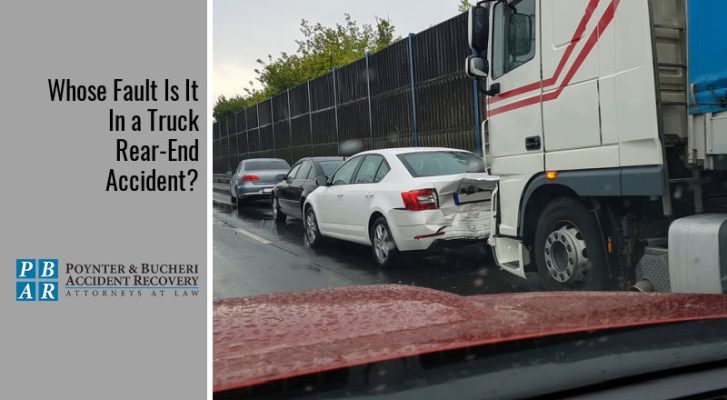
Whose Fault Is It In a Truck Rear-End Accident?

Semi-truck accidents can lead to incredibly serious or fatal injuries. Any car accident has the potential to be fatal, but semi-truck accidents are especially dangerous because they’re larger and weigh significantly more than standard passenger vehicles. In Indiana, trucks can weigh up to 80,000 pounds — as opposed to passenger cars which weigh an average of only 4,000 pounds — and that significant weight means that it takes a longer time for trucks to come to a complete stop, increasing the likelihood of a rear-end accident.
Truck rear-end accidents pose a serious threat to others on the road. In this blog, we discuss what you need to know about semi-truck stopping distance, factors that impact the amount of time it takes a truck to stop, and who may be liable for a truck rear-end accident.
Semi-Truck Stopping Distance
Semi-trucks require significantly more distance to come to a complete stop than standard passenger vehicles. According to the Federal Motor Carrier Safety Administration, it takes a standard passenger car 300 feet to stop when traveling at 65 miles per hour. For trucks, it takes twice that distance when traveling at the same speed, meaning 600 feet when traveling at 65 miles per hour.
With that significant stoppage time, passenger vehicle drivers need to be wary about trucks that could be following too closely. If you need to make a sudden stop, a truck driver may not be able to halt their vehicle in time before rear-ending your car, resulting in a serious or fatal accident.
Three elements make up total stopping distance: perception distance, reaction time, and braking distance. Perception distance deals with the amount of time it takes for a truck driver to realize that they need to slow down or stop their vehicle. Reaction time is the duration between the driver realizing they need to slow down or stop and the amount of time it takes for them to act and press on their brakes. Braking distance is the distance it takes for the vehicle to come to a stop once the driver presses on their brakes.
Factors Affecting Total Stopping Distance
A variety of factors can impact the amount of time it takes for a truck driver to slow down or stop. A truck driver’s load can substantially affect the amount of time it takes them to stop because a more significant load means the truck will be heavier, increasing their required stoppage distance. The speed at which the truck driver operates their vehicle will also play a significant role in their ability to stop.
Another critical factor affecting a truck’s ability to stop is adverse road conditions, such as rain, snow, or ice. Indiana frequently has freezing temperatures and heavy precipitation during wintertime. Truck drivers and others on the road need to consider slick weather conditions to operate their vehicles safely. Additionally, inclement weather and heavy precipitation can make it harder for drivers to see the road, which negatively impacts their perception distance.
Who Could Be At Fault for a Truck Rear-End Accident?
Because there are so many factors impacting a truck driver’s stoppage time, different people or companies could be responsible for the accident. These include:
- The truck driver: If the driver engaged in negligent behavior, they can be liable for the truck accident. Truck drivers can drive while distracted, while under the influence of drugs and alcohol, or while fatigued, all of which can negatively impact their perception and reaction times if a driver slows or stops in front of them.
- Other drivers: There are situations in which another motorist may have caused the rear-end accident. For example, if they changed lanes closely in front of a truck driver and then slowed or stopped, they could be found liable.
- The truck company: A truck company could be responsible for a wreck if they had drivers work long hours leading to fatigue or if they engaged in negligent hiring or training practices.
- Truck and truck part manufacturers: A truck or truck part manufacturer could equip a vehicle with a faulty part that leads to an accident.
- Truck maintenance company: If a mechanic or maintenance company fails to notice an apparent brake problem or another issue leading to a wreck, they could be found liable.
- Cargo companies: Cargo loads directly impact a truck’s weight and safety on the road. If a company fails to secure a load properly, it can negatively impact a truck driver’s ability to slow down or stop.
Contact a Rear-End Truck Accident Attorney
If you or a loved one is injured in a truck accident that was someone else’s fault, you shouldn’t have to pay out of pocket for injuries and damages. Truck accidents can lead to expensive medical bills, surgeries, and in-home care, and they can leave victims with permanent disabilities that affect their ability to work.
When you contact the personal injury lawyers at Poynter & Bucheri Accident Recovery Attorneys at Law, our seasoned legal experts will help you recover the damages you deserve, which may include compensation for medical bills, lost wages, loss of future earnings, pain and suffering, and more. Call our office at 1-800-265-9881, or you can request a free case review here.
